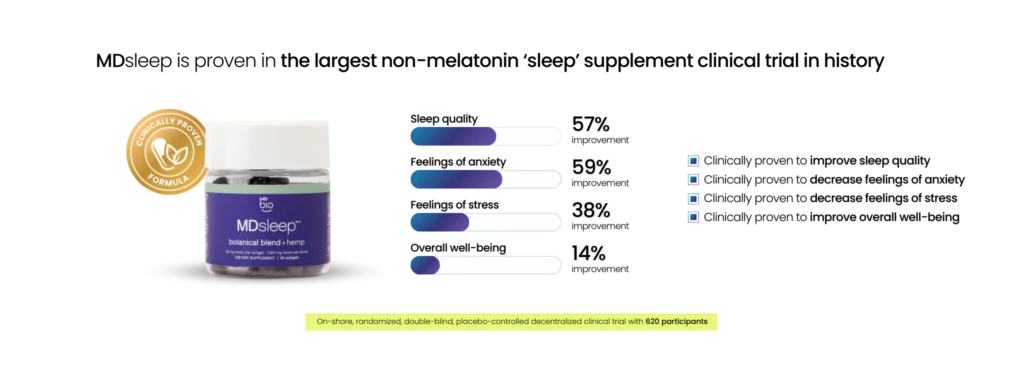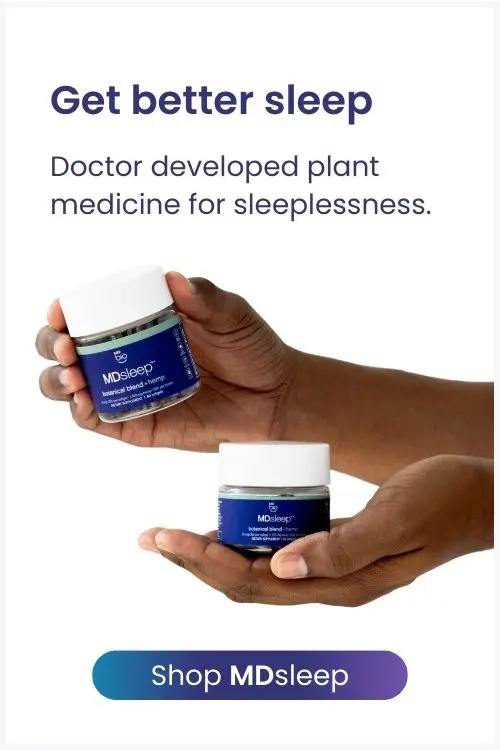

PhotoCredit_Andrea Piacquadio_pexels
When we’re desperate to find sleep, many of us turn to prescription sleeping pills. With so many prescription sleep aids available, it’s essential to know the benefits, side effects, and risks for addiction to each medication. Many also wonder if there is a non-prescription sleep aid that has been clinically proven to improve sleep. Let’s explore the various types of sleep aids available with the guidance of our physician team.
Types of Prescription Sleep Aids
Prescription sleeping aids vary in composition and effects, catering to those with difficulty falling or staying asleep.
Here are common types:
- Benzodiazepines: These include medications like temazepam and triazolam, typically used for short-term treatment. They work by depressing the central nervous system to promote sleep.
- Non-benzodiazepine hypnotics: Examples are zolpidem, zaleplon, and eszopiclone. These are known for fewer side effects compared to benzodiazepines.
- Melatonin receptor agonists: Ramelteon is a typical example. It targets melatonin receptors to regulate the sleep-wake cycle.
- Orexin receptor antagonists: These medications, like suvorexant, block the action of orexin, a wakefulness-promoting neuropeptide.
Depending on specific sleep issues and health conditions, each type may suit different individuals.
Best Sleeping Pills
Prescription sleeping aids vary in their mechanisms and potential side effects. This table highlights some common options:
| Medication | Advantages | Potential Side Effects |
| Ambien (Zolpidem) | Promotes sleep quickly, often used for short-term insomnia | Tingling sensations, changes in appetite |
| Lunesta (Eszopiclone) | Helps maintain sleep through the night, prescribed for longer-term use | Dizziness, headache |
| Rozerem (Ramelteon) | Targets melatonin receptors, potentially minimal dependency risk | Nausea, fatigue |
| Sonata (Zaleplon) | Short-acting, suitable for individuals who struggle to fall asleep quickly | Dizziness, confusion |
| Halcion (Triazolam) | Effective for sleep onset and short-term treatment | Drowsiness the next day, memory issues |
Each medication offers distinct benefits and drawbacks, impacting choices for treating insomnia. Always consult with a healthcare provider before starting any medication regimen.
Shop MDsleep
Find sleep aids that were designed by doctors and validated by research.
Prescription Sleeping Pills – Complete List
This comprehensive list of prescription sleep aids shows each drug’s benefits and side effects. Please consult your healthcare provider about their safety as well as the risk of dependency on the medication prescribed to you.
| Prescription Sleep Aid | Type of Drug | Benefits for Sleep | Side Effects |
| Zolpidem (Ambien, Edluar, Zolpimist) | Non-benzodiazepine | Helps with falling asleep and staying asleep | Dizziness, headache, nausea |
| Eszopiclone (Lunesta) | Non-benzodiazepine | Helps with falling asleep and staying asleep | Unpleasant taste, dizziness, headache |
| Lemborexant (Dayvigo) | Orexin receptor antagonist | Helps with falling and staying asleep | Drowsiness, headache, abnormal dreams |
| Suvorexant (Belsomra) | Orexin receptor antagonist | Helps with falling and staying asleep | Drowsiness, headache, abnormal dreams |
| Temazepam (Restoril) | Benzodiazepine | Helps with falling asleep | Drowsiness, dizziness, dependence |
| Daridorexant (Quviviq) | Orexin receptor antagonist | Helps with falling and staying asleep | Drowsiness, headache, abnormal dreams |
| Doxepin (Silenor) | Tricyclic antidepressant | Helps with staying asleep | Drowsiness, dry mouth, weight gain |
| Ramelteon (Rozerem) | Melatonin receptor agonist | Helps with falling asleep | Dizziness, fatigue, nausea |
| Triazolam (Halcion) | Benzodiazepine | Helps with falling asleep | Drowsiness, dizziness, dependence |
| Zaleplon (Sonata) | Non-benzodiazepine | Helps with falling asleep | Dizziness, headache, nausea |
| Zolpidem extended release (Ambien CR) | Non-benzodiazepine | Helps with falling asleep and staying asleep | Dizziness, headache, nausea |
| Gabapentin (Neurontin) | Anticonvulsant | Helps with sleep disturbances due to pain | Drowsiness, dizziness, fatigue |
| Carisoprodol (Soma, Vanadom) | Muscle relaxant | Helps with sleep disturbances due to muscle pain | Drowsiness, dizziness, dependence |
| Diazepam (Valium) | Benzodiazepine | Helps with sleep disturbances due to anxiety | Drowsiness, dizziness, dependence |
| Chlorzoxazone (Lorzone, Parafon Forte DSC) | Muscle relaxant | Helps with sleep disturbances due to muscle pain | Drowsiness, dizziness, liver toxicity |
| Cyclobenzaprine (Fexmid, Flexeril) | Muscle relaxant | Helps with sleep disturbances due to muscle pain | Drowsiness, dizziness, dry mouth |
| Metaxalone (Metaxall, Skelaxin) | Muscle relaxant | Helps with sleep disturbances due to muscle pain | Drowsiness, dizziness, nausea |
| Methocarbamol (Robaxin) | Muscle relaxant | Helps with sleep disturbances due to muscle pain | Drowsiness, dizziness, blurred vision |
| Orphenadrine (Norflex) | Muscle relaxant | Helps with sleep disturbances due to muscle pain | Drowsiness, dizziness, dry mouth |
| Baclofen (Lioresal) | Muscle relaxant | Helps with sleep disturbances due to muscle spasticity | Drowsiness, dizziness, weakness |
| Dantrolene (Dantrium) | Muscle relaxant | Helps with sleep disturbances due to muscle spasticity | Drowsiness, dizziness, liver toxicity |
| Tizanidine (Zanaflex) | Muscle relaxant | Helps with sleep disturbances due to muscle spasticity | Drowsiness, dizziness, dry mouth |

Non Prescription Sleeping Pills
Non-prescription sleeping pills, also known as over-the-counter (OTC) sleep aids, are medications that can be purchased without a doctor’s prescription to help alleviate occasional sleeplessness or insomnia. These products often contain antihistamines such as diphenhydramine or doxylamine, commonly found in allergy medications but have sedative properties promoting sleep. Some OTC sleep aids may include natural ingredients like melatonin, valerian root, or chamomile, believed to help regulate sleep cycles and reduce anxiety. A clinically proven non-prescription sleep aid is MDsleep, a combination of herbs and amino acids designed by physicians. MDsleep + hemp was found to both reduce feelings of anxiety and increase sleep quality in 59% of study participants.
Clinically Tested MDsleep + Hemp Sleep Enhancer
MDsleep offers a solution with clinically validated results, incorporating hemp as a primary component. This combination targets optimal rest, providing benefits from hemp to support better sleep patterns.
Physician-Formulated MDsleep Botanical Sleep Solution
Designed by medical experts, the MDsleep botanical formula incorporates natural ingredients specifically chosen for their sleep-promoting properties. This carefully constructed blend by physicians aims to assist those seeking to enhance their sleep quality through a natural approach.
Challenges with Dependency on Medicinal Sleep Aids
Prescription sleeping aids carry a risk of dependency for many individuals. These medications often lead to increased tolerance, meaning that larger doses are needed over time to achieve the same level of effectiveness. Psychological dependence can develop when the user begins to believe that sleep is impossible without the medication. Usage without medical guidance can escalate these issues, increasing the risk of tolerance and dependence. Additionally, abruptly stopping the medication may result in withdrawal symptoms, including anxiety and insomnia.
Listed below are common issues associated with dependency:
- Tolerance: Needing higher doses for the same effect.
- Withdrawal symptoms: Anxiety, insomnia.
- Psychological reliance: Belief in an inability to sleep unaided.
Addressing these challenges typically requires careful management and the guidance of a healthcare professional.
Frequently Asked Questions
What are alternative treatments for insomnia besides prescription sleeping pills?
Non-prescription sleep aids, such as MDsleep, clinically proven to improve sleep in 59% of study participants, are available without risk of dependency or serious side effects. Guided Sleep Meditations may also help calm your mind before bed.
What are the possible side effects of sleeping pills?
Sleeping pills may cause a variety of side effects, which can depend on the specific medication used. Common side effects include dizziness, headache, daytime drowsiness, and gastrointestinal issues such as nausea. Some individuals may experience memory problems or confusion, especially with higher doses.
How do sleeping pills interact with other drugs?
The combination of sleeping pills with other medications can lead to significant interactions. For example, using sleeping pills with opioids can amplify sedative effects and depress breathing, which is considered dangerous. Discussing all medications with a healthcare provider is crucial to avoid harmful interactions.
Are there any long-term risks with regular use of sleeping pills?
Prolonged use of sleeping pills may lead to tolerance, meaning higher doses are needed to achieve the same effect. There is also a risk of dependence, particularly with benzodiazepines and certain non-benzodiazepine sedatives. A healthcare professional should monitor long-term use to minimize these risks.
What Is the suggested adult dosage for sleeping pills?
The recommended dosage of sleeping pills for adults varies based on the specific medication and individual needs. It’s essential to adhere to a healthcare provider’s instructions and not exceed prescribed doses. Self-adjusting the dose without professional guidance can lead to adverse effects.
Can dependency develop from sleeping pills, and how is it managed?
Dependency can indeed develop from the extended use of sleeping pills. Managing this involves gradually tapering off the medication under medical supervision rather than abrupt cessation. Strategies might include cognitive behavioral therapy and exploring alternative sleep aids.
Read Next
CBG vs. CBD: Which Is Right for You?
Uncover the distinctions between CBG and CBD, including their mechanisms of action and potential wellness applications. Learn which cannabinoid may best support your sleep and overall health.
Read more
Full Spectrum Hemp: Benefits and Uses
Explore the advantages of full-spectrum hemp, including its diverse cannabinoid profile and potential for promoting better sleep and relaxation. Learn how the “entourage effect” may enhance the efficacy of hemp-based sleep aids.
Read more
CBN vs. CBD: Comparing Sleep Benefits
Discover how CBN and CBD differ in their origins, effects, and potential for improving sleep. This article covers their unique properties, legal status, and which might be better suited for your sleep needs.
Read more
CBN for Sleep: How Cannabinol Can Help
Delve into the science behind CBN as a sleep aid, including its sedative properties and how it interacts with your body’s endocannabinoid system. Find information on dosing, benefits, and considerations for using CBN to improve sleep.
Read more
THC for Sleep: Effects and Proper Dose
Learn how THC influences sleep patterns, its potential benefits and risks, and how to determine the right dosage for restful nights. This article provides expert guidance on using THC safely for sleep support.
Read more
CBN vs. CBD vs. CBG: A Comprehensive Guide
Compare CBN, CBD, and CBG side by side to see how each cannabinoid affects sleep, pain, and anxiety. Find out which may offer the most benefits for your wellness routine.
Read more
CBG vs. CBN: Which Cannabinoid Is Better for Sleep?
Explore the differences between CBG and CBN, two non-psychoactive cannabinoids, and learn how each may impact energy, focus, and sleep quality. This guide discusses their unique effects, benefits, and best uses for rest and relaxation.
Read more

Kia Michel, MD
Physician
Kia Michel, MD is an urologist and staff surgeon at Cedars-Sanai Medical Center in Los Angeles. As a founding member of Comprehensive Urology in Beverly Hills, he believes in treating all aspects of a patient’s wellbeing in order to achieve optimal health. After 25 years in private practice, Dr. Michel believes that a good night’s sleep is essential to maintaining your health, which inspired him to co-create the MDsleep community and the Sleep Doctors Blog.
What Our Readers Say
“Thanks to the insightful articles, I’ve finally managed to get back to my old sleep routine. I feel more rested and energetic each day!”
“The blog’s advice on sleep hygiene has been a game-changer for me. I never realized how small changes could make such a big difference.”
“I struggled with insomnia for years, but the tips I found here have helped me sleep through the night consistently. Thank you!”
“I no longer feel like a zombie from The Walking Dead series! I finally have my life back.”
Stay Updated with Our Newsletter
Join our community of sleep enthusiasts! Subscribe to receive the latest blog posts and exclusive sleep tips straight to your inbox.
Follow Us for More Sleep Insights
Discover Better Sleep Solutions
Unlock the secrets to a restful night by exploring our expert-backed articles and join our vibrant community for personalized sleep tips.
List of References:
- https://pmc.ncbi.nlm.nih.gov/articles/PMC9331058
- Fairfield, K., Tangney, C., & Rosenson, R.. (2022, November 2). Vitamin intake and disease prevention. In D. Seres & D. Gersh (Ed.). UpToDate., Retrieved May 18, 2023, from
https://www.uptodate.com/contents/vitamin-intake-and-disease-prevention - A.D.A.M. Medical Encyclopedia. (2015, April 2). Vitamins. MedlinePlus., Retrieved May 18, 2023, from
https://medlineplus.gov/vitamins.html - Lee, H. J., Choi, H., & Yoon, I. Y. (2020). Sh serum vitamin D levels impact sleep and daytime sleepiness according to working conditions. Journal of Clinical Sleep Medicine: JCSM: official publication of the American Academy of Sleep Medicine, 16(7), 1045–1054.
https://pubmed.ncbi.nlm.nih.gov/32108568/ - Huiberts, L. M., & Smolders, K. C. H. J. (2021). Effects of vitamin D on mood and sleep in the healthy population: Interpretations from the serotonergic pathway. Sleep medicine reviews 55, 101379.
https://pubmed.ncbi.nlm.nih.gov/32987320/ - Ikonte, C. J., Mun, J. G., Reider, C. A., Grant, R. W., & Mitmesser, S. H. (2019). Micronutrient Inadequacy in Short Sleep: Analysis of the NHANES 2005-2016. Nutrients, 11(10), 2335.
https://pubmed.ncbi.nlm.nih.gov/31581561/ - Johnson, L. (2022 November). Thiamin Deficiency. Merck Manual Professional Version., Retrieved May 18, 2023, from
https://www.merckmanuals.com/professional/nutritional-disorders/vitamin-deficiency,-dependency,-and-toxicity/thiamin-deficiency
8. Hysing, M., Strand, T. A., Chandyo, R. K., Ulak, M., Ranjitkar, S., Schwinger, C., Shrestha, M., & Kvestad, I. (2022). The effect of vitamin B12-supplementation on actigraphy measured sleep pattern; a randomized control trial. Clinical nutrition (Edinburgh, Scotland), 41(2), 307–312.
https://pubmed.ncbi.nlm.nih.gov/34999324/

